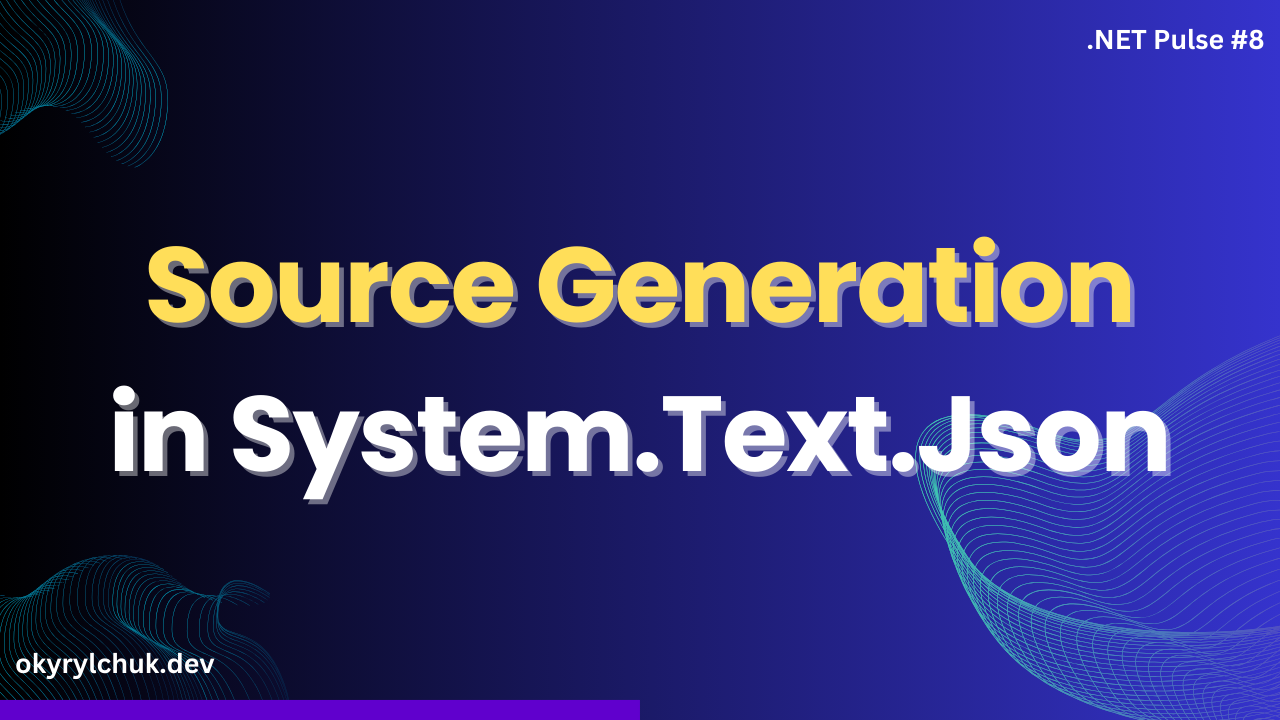.NET 9 with updates for System.Text.Json is coming soon. It’s time to overview highly requested features like nullable reference type support, customizing enum member names, out-of-order metadata deserialization, customizing serialization indentation, and many more.
Customizing Enum Member Names
A new JsonStringEnumMemberName attribute allows customizing enum member names.
var json = JsonSerializer.Serialize(MyState.Ready | MyState.InProgress);
Console.WriteLine(json);
// "Ready, In Progress"
[Flags, JsonConverter(typeof(JsonStringEnumConverter))]
enum MyState
{
Ready = 1,
[JsonStringEnumMemberName("In Progress")]
InProgress = 2,
}Respecting Nullable Notation
A new RespectNullableAnnotations option in the JsonSerializerOptions enables respect for non-nullable reference types in serialization and deserialization.
JsonSerializerOptions options = new()
{
RespectNullableAnnotations = true
};
JsonSerializer.Serialize(new Dto(null!), options);
// Throws System.Text.Json.JsonException
JsonSerializer.Deserialize<Dto>("""{ "Value" : null }""", options);
// Throws System.Text.Json.JsonException
record Dto(string Value);However, the feature has some limitations; System.Text.Json does not support nullability enforcement on:
- Any properties, fields, or constructor parameters that are generic.
- Collection element types when we cannot distinguish between List<string> and List<string?> types.
- Top-level types that are passed when making the first JsonSerializer.(De)serialize call.
You can enable respecting nullable notation in the project settings.
<ItemGroup>
<RuntimeHostConfigurationOption Include="System.Text.Json.JsonSerializerOptions.RespectNullableAnnotations" Value="true" />
</ItemGroup>Customizing Identation
A new IndentCharacter and IndentSize options in the JsonSerializerOptions allow the indent character and size to be customizable.
var person = new
{
Name = "Oleg",
Surname = "Kyrylchuk"
};
var options = new JsonSerializerOptions
{
WriteIndented = true,
IndentCharacter = '\t',
IndentSize = 2,
};
string json = JsonSerializer.Serialize(person, options);
Console.WriteLine(json);
//{
// "Name": "Oleg",
// "Surname": "Kyrylchuk"
//}JSON Schema Exporter
A new JsonSchemaExporter type allows exporting JSON schema that represents a .NET type.
JsonNode schema = JsonSchemaExporter.GetJsonSchemaAsNode(
JsonSerializerOptions.Default,
typeof(Person));
Console.WriteLine(schema);
public class Person
{
public string Name { get; set; }
public int Age { get; set; }
public string Title { get; set; }
}JSON schema:
{
"type": [
"object",
"null"
],
"properties": {
"Name": {
"type": [
"string",
"null"
]
},
"Age": {
"type": "integer"
},
"Title": {
"type": [
"string",
"null"
]
}
}
}Streaming Multiple JSON Documents
A new AllowMultipleValues option in the JsonSerializerOptions allows reading multiple, whitespace-separated JSON documents from a single buffer or stream.
The option also allows reading JSON documents with trailing data that is invalid JSON.
JsonReaderOptions options = new()
{
AllowMultipleValues = true
};
Utf8JsonReader reader = new(
"""
{"name": "oleg"} [1,2] {}
"""u8,
options);
while (reader.Read())
{
Console.WriteLine(reader.TokenType);
}
// Output:
// StartObject
// PropertyName
// String
// EndObject
// StartArray
// Number
// Number
// EndArray
// StartObject
// EndObjectRespecting Required Constructor Parameters
A new RespectRequiredConstructorParameters option in the JsonSerializerOptions enables validation if required constructor parameters are missing.
JsonSerializerOptions options = new()
{
RespectRequiredConstructorParameters = true
};
// Throws exception JsonException
JsonSerializer.Deserialize<RecordDto>("{}", options);
// Throws exception JsonException
JsonSerializer.Deserialize<ClassDto>("{}", options);
record RecordDto(string Value);
class ClassDto(string value)
{
public string Value => value;
}JsonSerializerOptions.Web
A JsonSerializerOptions has a new singleton instance of JsonSerializerOptions – Web.
It has the serializer options that ASP.NET Core uses for web applications.
var me = new Person("Oleg", "Kyrylchuk");
string webJson = JsonSerializer.Serialize(
me,
JsonSerializerOptions.Web // Defaults to camelCase naming policy.
);
Console.WriteLine(webJson);
// {"firstName":"Oleg","lastName":"Kyrylchuk"}
record Person(string FirstName, string LastName);Ordering JsonObject Properties
JsonObject implements IList<KeyValuePair<string, JsonNode?>>.
It means new ordered-dictionary-like APIs that enable explicit property order manipulation. Among the new methods are:
- IndexOf
- Insert
- SetAt
- RemoveAt
- GetAt.
JsonObject jObj = new()
{
["Name"] = "John",
["Age"] = 30
};
Console.WriteLine(jObj is IList<KeyValuePair<string, JsonNode?>>); // True
int agePosition = jObj.IndexOf("Age");
jObj.Insert(agePosition, "TestProperty", "Foo");
// {"Name":"John","TestProperty":"Foo","Age":30}
jObj.SetAt(2, "Surname", "Doe");
// {"Name":"John","TestProperty":"Foo","Surname":"Doe"}
jObj.RemoveAt(1);
// {"Name":"John","Surname":"Doe"}
KeyValuePair<string, JsonNode?> firstElement = jObj.GetAt(0);
// {"Name":"John"}JsonElement DeepEquals
In .NET 8, the JsonNode type got the DeepEquals method. In .NET 9, a similar method gets the JsonElement type.
var json = "{\"name\":\"oleg\"}";
JsonElement left = JsonDocument.Parse(json).RootElement;
JsonElement right = JsonDocument.Parse(json).RootElement;
JsonElement.DeepEquals(left, right); // TrueOut-of-Order Metadata Reads
Certain features of System.Text.Json are polymorphism or ReferenceHandler.Preserve requires emitting metadata properties.
However, metadata properties must be defined at the start of the JSON object while deserializing. If they are not, the exception is thrown.
That was the issue with deserializing JSON payloads that do not originate from System.Text.Json.
JsonSerializerOptions options = new()
{
ReferenceHandler = ReferenceHandler.Preserve
};
Base value = new Derived("Name");
JsonSerializer.Serialize(value, options);
// {"$id":"1","$type":"derived","Name":"Name"}
var metadataAtTheEndJson = """{"Name":"Name","$type":"derived"}""";
JsonSerializer.Deserialize<Base>(invalidJson, options);
// System.Text.Json.JsonException: The metadata property is
// either not supported by the type or is not the first property
// in the deserialized JSON object
[JsonDerivedType(typeof(Derived), "derived")]
record Base;
record Derived(string Name) : Base;A new AllowOutOfOrderMetadataProperties fixes the issue and disables this restriction.
JsonSerializerOptions options = new()
{
AllowOutOfOrderMetadataProperties = true
};
var metadataAtTheEndJson = """{"Name":"Name","$type":"derived"}""";
JsonSerializer.Deserialize<Base>(metadataAtTheEndJson, options); // Success
